A Conversation With Nicole Riegel, Writer and Director Of Holler
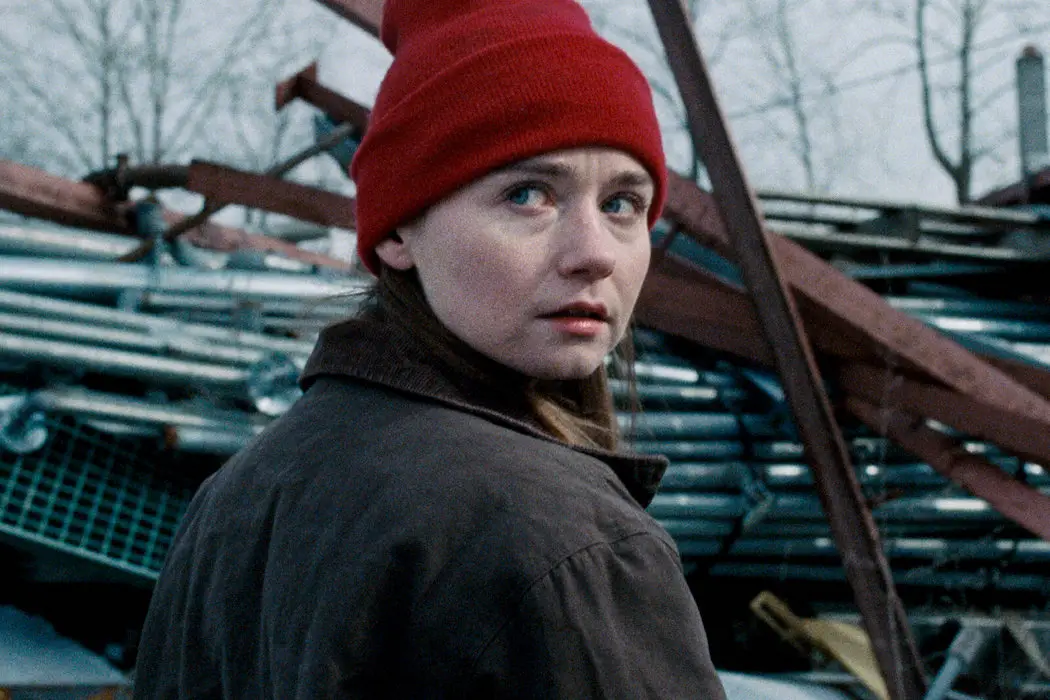
Reyzando Nawara is a passionate film and TV enthusiast from…
Nicole Riegel‘s directorial feature debut Holler is a story about resilience. It centers on a 17-year-old girl named Ruth (Jessica Burden), who struggles to escape her hometown of Jackson, Ohio to get a higher education. One day, when Ruth finds out that she’s accepted to college, she and her brother Blaze (Gus Halper) decide to join a shady metal scrap crew managed by a man named Hark (Austin Amelio). Though they know that the work is dangerous and illegal, they still go along with it, as their options to collect money for the tuition are limited.
In writing the script, Riegel draws inspiration from her own story of growing up in Jackson, giving the film an honest and personal touch. While the story never loses sight of the sad reality that happens to the people of Jackson — how the system has failed the community — Holler never resorts to melodrama. What it mostly offers is a raw portrait of a girl trying her hardest to follow her dream. We recently had the pleasure of speaking to Riegel to talk about coming home to Jackson, writing the town as a character, and also about Phoebe Bridgers and Good Will Hunting.
Reyzando Nawara for Film Inquiry: Holler is your feature directorial debut, and I believe that it’s semi-autobiographical and also loosely based on your short film of the same name. What eventually led you to tell this very personal story?
Nicole Riegel: The movie is loosely based on my life and aspects of my own childhood in a similar way to the movie in your t-shirt [Minari]. I struggled for years to get any movie made because I wanted to make something that was personal and something that I could make that no else could — a story that no one would ever ask me to give away to someone else. So I sort of looked back at my own childhood and why it was so difficult for me to go to college to get an education and just why that chunk of my life as a young girl was so challenging for me and also all of the economic reasons why it was so challenging.
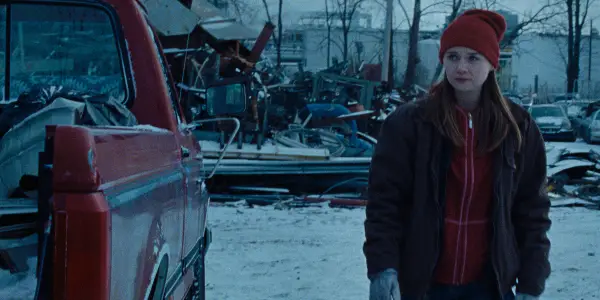
What really came into focus for me was all of the institutions pushing me down as a young girl while I was just trying to go to school. And the scrap world was something baked into the DNA of the environment that I grew up in and was very exposed to. As a young girl, I knew about the world just by growing up there. And a portrait of a really great film started to form for me just by looking back at that part of my life.
So how was it like coming back to the town that you left years ago to shoot the film?
Riegel: I left the town many years ago. [laughing] I’ve been gone for almost twenty years actually. Coming back was very cathartic, in a way — I’ll tell you something that I actually haven’t told anyone in interviews because it just happened recently. I went home to make the film and it was very personal, and I was filming the 17-year-old version of myself through the wonderful Jessica Barden. And then just this week actually I went back to watch the film in the movie theater that I worked in on that same town.
The teacher you saw in the film — played by a different teacher by the way — who discourages Ruth and tells her to go to the I.T. program, which also happened to me exactly like that, now almost twenty years later sought me out and apologized to me. So I kept having these moments where I went back and made the film there and it was so cathartic, but then now, I’m going back and I’m sharing the film with my home and there’s this full circle moment sort of continue to happen with the film.
In the film, Ruth has to keep her ambitions hidden inside because of her living situation, and I’m sure a lot of people can resonate with that. Tell me about the process of crafting this character.
Riegel: I wanted to show a portrait of a girl who on one hand is very much myself, so it was easy to write this character — I was writing things and lines or dialogues that actually happened to me. But on the other hand, I was also writing her with a little bit of wisdom and perspective that I now have as a grown woman. I get very bummed out when people talk about likable women on-screen because I’ve never really liked the idea of it; I like portraits of very unconventional women.
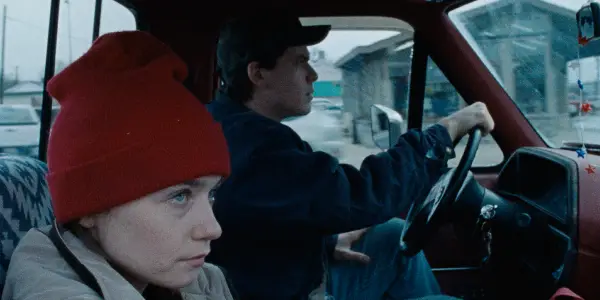
I think the reason that a lot of people like the film is because they can relate to Ruth. It’s a character who’s smart — it’s funny that I wrote her as someone who’s good at math because I’m really not [laughing] — and also assertive but not in a way that comes across as abrasive. She has moments where she does assert herself and that’s where people may view her as unlikable, but she’s a very well-rounded on-screen heroine. I approached the character with Jess Barden as if we were gonna create a real-life superhero, maybe a superhero for independent cinema, and that’s how pretty much we look at Ruth.
The first thing that we notice from Ruth is her red beanie. What does it symbolize?
Riegel: It symbolizes her passion, her singularity, and her outsider-ness, that she does not fit in this environment or world. But it’s still within the color palette of the film as a way to keep her connected to her root.
There are two central relationships in the film: the first is between Ruth and her brother, Blaze, and the second one is between Ruth and Hark. What did you want to capture from these two opposite dynamics?
Riegel: Ruth’s relationship with her brother is the heart and soul of the film. He represents someone who’s not going and doesn’t want to leave town, and his tragedy is that he doesn’t believe in himself the way he believes in Ruth. I was raised by some family members who I’ve always felt believed in me more than they believed in themselves. And that is a weight and pressure that I felt in my life. I’m glad that I was able to convey that through Blaze, and Gus Halper gives such a compassionate and tender performance. I’m so proud of him.
Then the relationship between Ruth and Hark is so interesting because they’re actually so much alike. I wanted the audience to feel the potential danger of that relationship between this 30-something-year-old man and this 17-year-old girl in a way that feels realistic. This kind of relationship happens not just in my hometown, but all over the world. My favorite thing about that relationship is as an audience member, we feel the flirtations and the tension and also the competitiveness between them, but there’s a part of us that’s saying, “Please don’t let this girl fall into this relationship. Please don’t let her go down that path,” because we see the future and we see how it is going to trap Ruth in that town.
The film is intentionally littered with all of those scenarios just to show how fragile Ruth’s existence is, and Hark is one of those potential situations that we don’t want her to fall into. But he is also actually a victim of this larger system. He’s really not the antagonist of the film. The villain of Holler is this system that all these characters are in.
Jessica Barden is exceptional as Ruth. What was it about her that made you go, “Oh this is my Ruth”?
Riegel: I’m a little biased, but Jess Barden gave the performance of the year for me. She has an incredible works ethic. She’s attached to the film for almost two years and stuck with me and this independent project while I was trying to get financing for it. Not a lot of people would’ve done that, but she was committed to this. She really wanted this role.
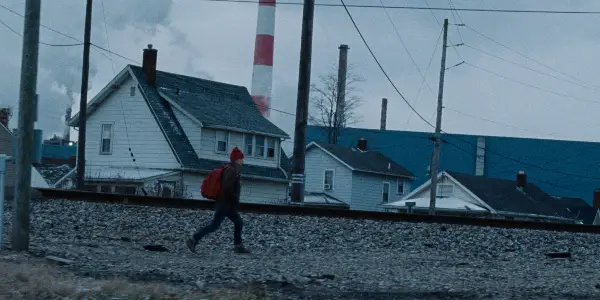
She also comes from a working-class background in Northern England, so even though we were not from the same place nor has she scrapped a building prior to this film, we found common ground. She brought a lot of that background to the role and the film, and by background, I mean the way of thinking you have when you’re from a working-class. There are ways of thinking that you inherit from a certain class system, and she understood that inherently for the character.
You wrote the town as a character in the film. So how did you make sure to portray it as honestly and authentically as possible?
Riegel: You’re right, I wrote the town as a character. Thank you for noticing that. I grew up there, I walked and drove those streets, I’ve been in all of those stores. The abandoned school that you see in the film used to be where my grandmother went in second grade, and it still has the American flag and all the chalkboards from her old classroom there, even a motivational sign with something like, “Be yourself, who else is more qualified?” — [laughing] it has all of that. I knew this place like the back of my hand. And as for the scrapyards, I knew them as well, but I did have to do quite a bit of research. I spent maybe a full year taking trips back to Southeast Ohio to observe and absorb those scrapyards.
The look of the film is very raw. It’s grainy and has a lot of natural lights, and you shot it with Super 16. How did you and your cinematographer, Dustin Lane, establish the visual language for the film?
Riegel: We worked together for over a year by watching films that were touchstones for Holler to look for inspiration. Andrea Arnold and Kelly Reichardt and Ken Loach were huge influences on the film. Just by looking at those and figuring out what I liked and didn’t like, I went into the film with a very specific look. I wanted it to feel like a documentary — I came up from a documentary film program largely — and I also wanted to have what I called a poetic realism to it so that it still felt very cinematic. With the Super 16, that was a day one decision. I made something in scrapyard previously on digital to see what I liked, and as beautiful as it looked, it didn’t come alive in the way that I wanted it to. Holler is a film about a community that feels left behind in the world, and I feel that Super 16 also feels very left behind.
There’s one moment in the film that stood out to me the most: It was when Ruth and her mom (Pamela Adlon) sitting together, no spoken words, with a cigarette box between them, and then their fingers touch one another. Tell me more about this scene.
Riegel: Thank you. I’ve never talked about that scene before, and it’s one of my favorites too. I actually forget if it’s in the script — I think it was a decision that Jess and Pamela made with the cigarettes to touch them in that way. As you know, you’re not allowed to touch each other in that place, but Ruth has this yearning to simply connect to her mother through small physical touch. And that box of cigarettes is the one way they can have that physical touch. It is so much with so little. I really love that scene. And everything that was there was just as is — no production design was done to that space.
I wanna talk a little bit about the Phoebe Bridgers’ needle-drop toward the ending of the film. What feelings that you want to convey through the song?
Riegel: I will always talk about Phoebe Bridgers. [laughing] This is my plot to get her to watch the film in theaters. Anyway, another touchstone for Holler is the film Good Will Hunting, which is one of my favorite films of all time. I related so much to that character, even though when I watched it as a young person, I sorta stopped and asked, “Where are the women in this film?” But I connected so much to the movie and the characters and the heart of the film. And it’s a film that left such a huge impression on me.
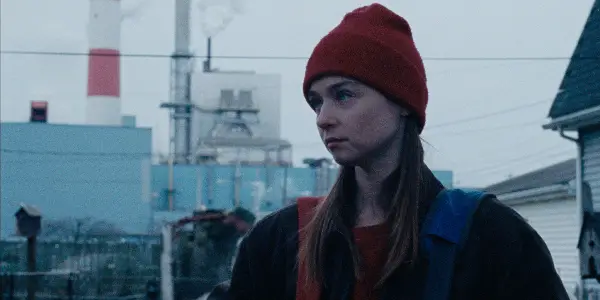
If you look at the ending shot of Good Will Hunting, with the car driving away and “Miss Misery” by the late, great Elliot Smith — may he rest in peace — playing, that road out of town is actually the same road I drove. And in Holler, the ending is almost the same way, with Ruth driving her brother’s truck while Phoebe Bridgers is playing in the background. Elliott Smith is a massive influence on Phoebe’s music, so to me, it is a way to connect those two films and influences — not just cinematic, but also musical. The song “Scott Street” from Phoebe’s first album Stranger in the Alps, is just lyrically and in feeling and melody so perfect for that moment. And because Ruth is starting a new chapter, it feels appropriate to go from score to song.
If you could recommend a double feature to watch with Holler, what film would you pick?
Riegel: I pick one movie to watch with Holler? I’m going with Rosetta by the Dardenne brothers.
Film Inquiry thanks Nicole Riegel for the time to do the interview.
Holler is now playing on select theaters and on VOD.
Does content like this matter to you?
Become a Member and support film journalism. Unlock access to all of Film Inquiry`s great articles. Join a community of like-minded readers who are passionate about cinema - get access to our private members Network, give back to independent filmmakers, and more.
Reyzando Nawara is a passionate film and TV enthusiast from Indonesia. When he's not watching TV and movies, he likes to cook and make sorbet.













